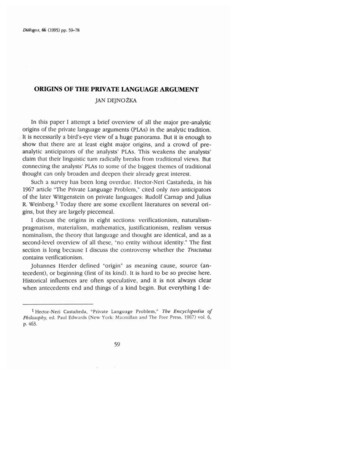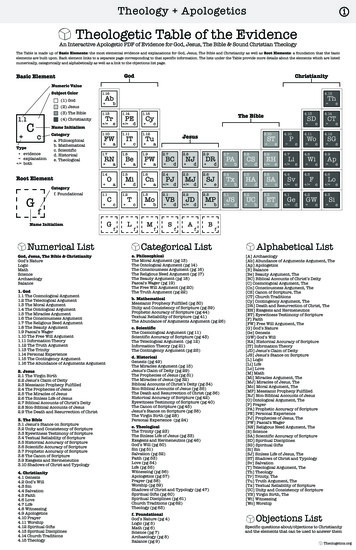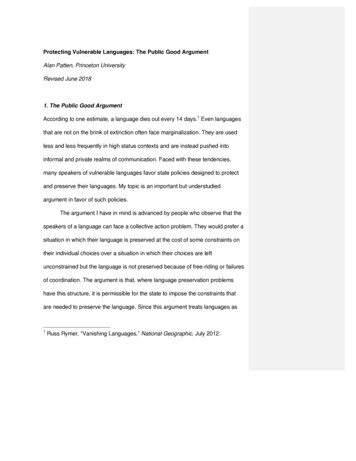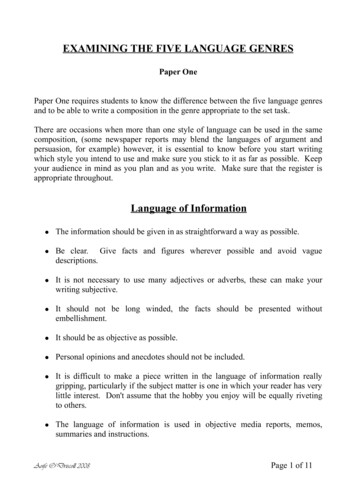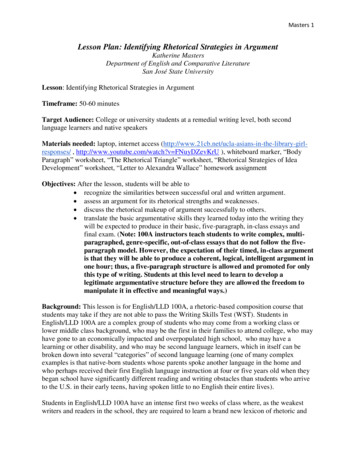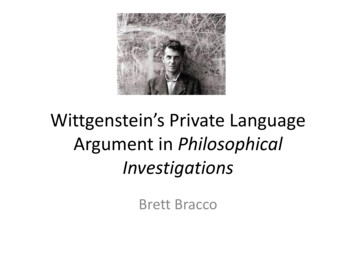
Transcription
Wittgenstein’s Private LanguageArgument in PhilosophicalInvestigationsBrett Bracco
Central Question: Is a Private LanguagePossible?- In § 243 of Philosophical Investigations, Wittgensteinposes the question regarding whether a privatelanguage is possible.- A private language is a language in which a personcan express their inner thoughts and feelings throughwriting or vocal expressions.- Because such a language would refer to our innersensations which are private, a private language canonly be understood by the individual who uses it,and is therefore unable to be learned by others ortranslated.
Words Express Sensations Rather than DescribeThem-In the beginning of Wittgenstein’s Private Language Argument, he first usesthe example of pain to establish how words refer to our sensations.-Wittgenstein states that “words are connected with the primitive, thenatural, expressions of the sensations and used in their place. A child has hurthimself and he cries; and then adults talk to him and teach him exclamationsand, later, sentences. They teach the child new pain behavior” (PhilosophicalInvestigations §244)Wittgenstein then asserts that “pain” does not mean crying, instead “theverbal expression of pain replaces crying and does not describe it”(Philosophical Investigations § 244).
Wittgenstein on Private Sensations Although we have private sense experience, the criteria fordescribing private sensations relies solely upon the rulesgoverning the language imposed upon us by society (notprivate), rather than the sensations themselves. Thus, if one were to describe private sensations, they wouldhave to refrain from using words that belong to publiclanguage. Therefore, it could be presupposed that one couldeffectively describe private sensation through ostensivedefinition (Wittgenstein is highly skeptical of this).
Thought Experiment: The Sensation “S”“Let us imagine the following case. I want to keep a diary about therecurrence of a certain sensation. To this end I associate it with the sign “S”and write this sign in a calendar for every day on which I have the sensation –I will remark first of all that a definition of the sign cannot be formulated –But still I can give myself a kind of ostensive definition. – How? Can I point tothe sensation? Not in the ordinary sense. But I speak, or write the sign down,and at the same time I concentrate my attention on the sensation and so as itwere, point to it inwardly. – But what is this ceremony for? For that is all itseems to be! A definition surely serves to establish the meaning of a sign.Well that is done precisely by the concentrating of my attention; for in thisway I impress on myself the connexion between the sign and the sensation. –But “I impress it on myself” can only mean: this process brings it about that Iremember the connexion right in the future. But in the present case I have nocriterion of correctness. One would like to say: whatever is going to seemright to me is right. And that only means that here we can’t talk about ‘right’ ”(Philosophical Investigations § 258).
How the “S” Thought Experiment Displays That UsingOstensive Definitions for Private Language isProblematic? Every time we write “s” on the calendar to indicatethat we felt that particular sensation, we are relyingon our memory of the sensation. It is impossible to tell if the EXACT same sensation isbeing experienced every time we write “s” given thatmemory is faulty. Therefore, unlike true language, there is no “criterionfor correctness whatever is going to seem right forme is right for me. And that only means here wecan’t talk about ‘right’”(Philosophical Investigations §258).
Sensations Do Not Play Significant Roles in OurLanguage Use To demonstrate the confusion regarding that nature ofsensation words, Wittgenstein poses the question, “What amI to say about the word “red”?-that it means something‘confronting us all’ and that everyone should really haveanother word, besides this one, to mean his own sensationsof red? Or is it like this: the word “red” means somethingknown to everyone; and in addition for each person, it meanssomething known only to him?” (Philosophical Investigations§ 273). Wittgenstein believes this way of reasoning is flawed because“red” does not mean something known only to the individualbut rather “refers something known only to him”(Philosophical Investigations § 273).
§ 293. The Beetle in a Box“Suppose everyone had a box with something in it: we call it a “beetle”. Noone can look into anyone else’s box, and everyone says he knows what abeetle is only by looking at his beetle- Here it would be quite possible foreveryone to have something different in his box. One might even imaginesuch a thing constantly changing- But suppose the word “beetle” had a use inthese people’s language? If so it would not be used as the name of a thing.The thing in the box has no place in the language game at all, not even as asomething: for the box might even be empty” ( Philosophical Investigations §293).
Purpose of “Beetle in the Box” Beetle in box shows that introspection does not determinethe meaning of our sensation language. Since no one can see into another person’s box likewise tohow no one can see another person’s sense experience, thequestion of correctness can never come up. Thus the sensation itself is irrelevant to the meaning of theword but merely indicates that a particular sensation ispresent.
Main Points of Wittgenstein’s Private LanguageArgument Language is governed by rules established by society . There isno way to effectively express one’s inner sense experiencewith language outside of these constrictions. Sensations are private although sensation words do not havesensations themselves in their meanings. Instead, sensationswords merely express that a particular sensation is present. Private language is not possible because it requires ostensivedefinitions which are meaningless due to lacking a “criteria forcorrectness” , as well as faulty, due to relying on memory.
Argument Language is governed by rules established by society . There is no way to effectively express one [s inner sense experience with language outside of these constrictions. Sensations are private although sensation words do not have sen
